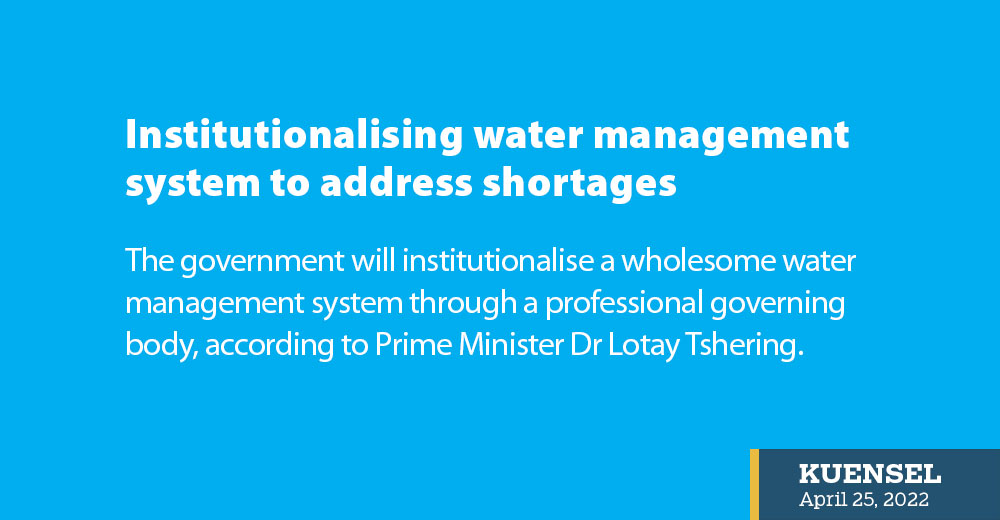Chhimi Dema
The government will institutionalise a wholesome water management system through a professional governing body, according to Prime Minister Dr Lotay Tshering.
He said this during the fourth Asia-Pacific Water Summit on April 23 where he acknowledged that the country is not able to solve the issue of taking drinking and irrigation water to the homes of the people despite generous per-capita water availability.
“That way [by institutionalising water management system], we will be able to explore required resources, keep pace with emerging water technologies and introduce dynamic water policies and coordination,” the Prime Minister said.
The fourth Asia-Pacific Water Summit was held in Kumamoto City, Japan, where high-level delegates including heads of states and representatives from international organisations in the Asia-Pacific region discussed various water-related issues.
Virtually addressing the summit, Lyonchhen spoke about the spiritual significance and economic value of water for the country and current issues of drinking and irrigation water.
“Water projects were just seen as one component of developmental activities and not approached in a wholesome manner. Without a dedicated institution, our approaches to water management have been in bits and pieces,” he said.
He highlighted the De-suung National Service water projects and its importance in solving water scarcity issues and engaging youth in building robust water infrastructure in the country. “Through this royal initiative, communities across the country were connected with water for drinking and irrigation in just about two years.”
According to De-suung Annual Report 2022, 12 water projects are underway and 19 are completed so far benefitting more than 2,000 households.
Lyonchhen welcomed the announcement of the Japanese initiative to strengthen national capacities in the Asia-Pacific region.
He said that the nations, in addition to meeting the conventional needs and utilities, must prepare to embrace fast-emerging technologies around water. “Only then will be able to derive the true meaning of its reference as ‘white gold’ that enriches every life on earth.”
The water summit with the theme, “Water for Sustainable Development – Best Practices and the Next Generation”, discussed how to implement the recommendations given in the “Yangon Declaration” adopted at the third Asia-Pacific Summit 2017 in Myanmar.
The outcome of the two-day summit as the Kumamoto Declaration will contribute to the mid-term review of the UN Decade of Action for Water in March next year.
The Kumamoto Declaration is a collection of activities and commitments the nations make to resolve water-related issues in the region.
The UN conference next year is aimed for countries to fundamentally understand, value and manage water better and take concerted action to achieve the internationally agreed water-related goals and targets, including those contained in the 2030 Agenda for Sustainable Development.


